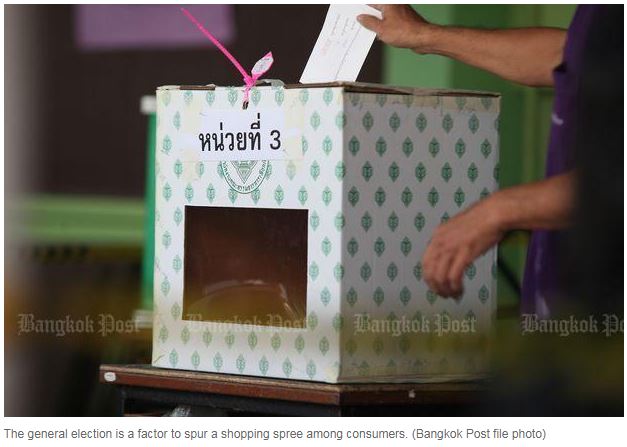Thailand: Poll, VAT refund set to increase spending
Modern trade sentiment is expected to become more bullish in the first quarter this year as the upcoming general election and the value-added tax (VAT) refund for Chinese New Year shopping could spur a shopping spree among consumers.
Thanavath Phonvichai, vice-president of research at the University of the Thai Chamber of Commerce (UTCC), said the election being set on March 24 and the shopping tax breaks are expected to greatly benefit not only large and medium-scale retail operators in Bangkok and the provinces, but also the overall economy in the first quarter.
The university estimated 30-50 billion baht would be circulated during the campaign, boosting economic growth by 0.2-0.3%, while the government’s shopping tax incentives from Feb 1-15 are expected to increase consumer spending by around 10 billion baht, raising GDP growth by 0.05-0.1%.
The cabinet in mid-December approved a VAT refund for those who spend during the designated period, which coincides with Chinese New Year on Feb 5.
Thailand has a 7% VAT on domestic purchases of goods and services.
Refund claimants are required to pay via debit cards linked to savings accounts using PromptPay at shops that have electronic data capture machines connected to point-of- sale terminals. This enables spending information to be directed to the Revenue Department.
Purchases made through the government’s welfare smartcards are not entitled to VAT returns. The VAT will be refunded through PromptPay, the government’s online money transfer system.
Qualifying shoppers will be eligible for a 5% VAT refund for every purchase of products and services that includes VAT. The remaining 2% of VAT will go to the government’s coffers. To receive the maximum 1,000-baht VAT refund, shoppers will be required to spend 21,400 baht.
Mr Thanavath said an exact general election date will result in higher confidence among both local and foreign investors. An election will improve the country’s image, drawing more capital inflow and attracting investors to the Eastern Economic Corridor, he said.
In a related development, the university yesterday unveiled its new Modern Trade Sentiment Index for the fourth quarter of 2018, which stood at 52.1 points out of 100, up from 51.7 in the third quarter. The third quarter marked the first survey.
The survey was based on 78 samples covering department stores, supermarkets, hypermarkets and convenience stores during Dec 25, 2018 to Jan 19, 2019. The university attributed the rise to positive factors such as an increase in foreign tourists, celebrations during the New Year festival and relatively low oil prices.
However, it noted negative factors still exist that will affect modern trade performance for the period including an interest rate hike and low farm prices.
Surong Bulakul, vice-chairman of UTCC, said the key areas of concern for modern trade are limited economic growth and low purchasing power. Modern trade operators are proposing the government help stimulate private and consumer consumption, raise farmers’ income and ease import tariffs on products tourists like to buy.
Source: https://www.bangkokpost.com/business/news/1617386/poll-vat-refund-set-to-increase-spending


 Thailand
Thailand




